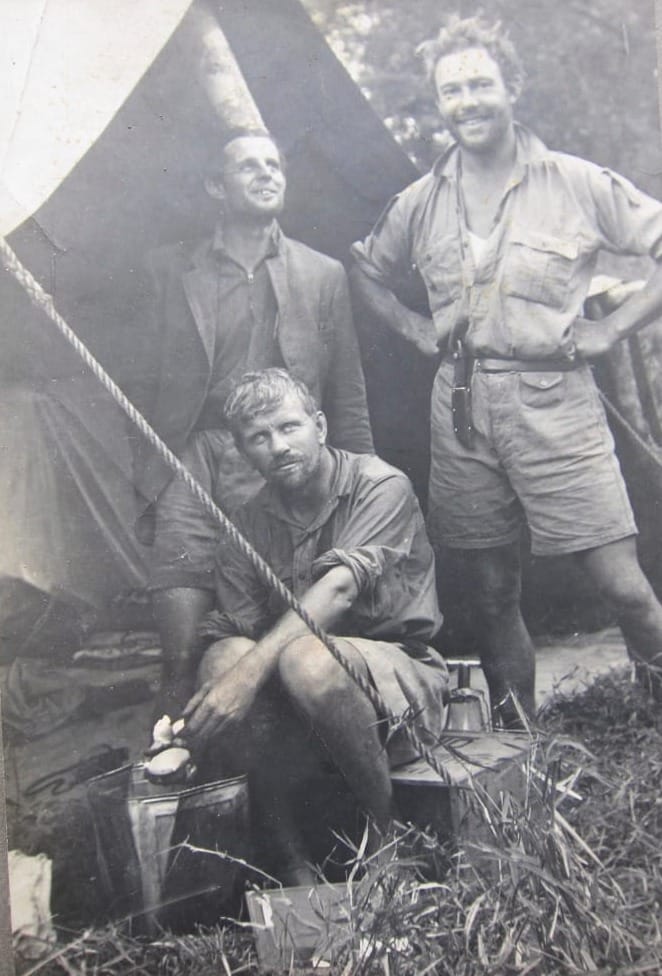Persevering
The make shift tent Edgar Whitehead and Haynes-Hill had fashioned from a huge railway carriage tarp held up in the night long, noisy rainstorm.

By first light the track had become a quagmire. Although winter rain does occur along the Eastern border mountain chain, this was exceptionally and unexpectedly heavy. Edgar's truck would never be able to traverse the road back to search for their companions Nat Williams and John MacDonald in the second vehicle.
Carrying some food for the stranded party, Edgar set out with one African companion to search for Nat and John. Fifteen miles back Nat’s car had skidded off the road and was bogged down. Unable to extricate the car he and John had slept in it because while setting up camp they estimated the roar of lions were within a hundred yards or so.
Considerable digging was required to free the car and get it back on the road. It was decided that Nat would bring it on with the two Africans as soon as the road dried sufficiently to make it possible to get through.
Edgar and John, carrying rifles in this lion country, struck out for the camp. For Edgar this was a thirty-mile round trip in extreme heat, including a very steep climb up into the mountainous area from the plain below.
There were no big game in the area where he and Haynes-Hill had camped, but it was completely overrun by guinea fowl. In the planting season the guinea fowl descended on the fields and picked up the maize seed almost as soon as it was planted. All the African arable lands were stubble at the time with odd belts of bush and trees here and there. The local headman wanted Edgar to decimate the guinea fowl before his people planted their next crop.
Waiting for Nat to rejoin them, Edgar arranged with the headman to provide about thirty beaters. He was amazed when they turned out in football jerseys, speaking fluent English in this remote area! It was Shangaan country. All of them had worked on the Rand mines.
Once Nat finally arrived, they spread out behind the belts of bush with their guns. The birds were clumsy on take-off, but flew exceptionally well–as well as pheasants once they were really airborne. A series of drives yielded over thirty brace. Edgar kept three brace for their use and gave the rest to the beaters, who were delighted, not only for the extra meat but also at the execution they had achieved.
It was time to move on. Their party struggled through the road from Espungabera district to the Sabi River at Massanjena. The one Portuguese government official stationed there had been relieved by launch from the mouth of the Sabi about three months previously. Their party was the first to get through by road since before the last rainy season. Grateful for the first mail since then Edgar’s party received all possible co-operation and information as to where to find game.
The historical novel Whitewashed Jacarandas and its sequel Full of Possibilities are both available on Amazon as paperbacks and eBooks.
These books are inspired by Diana's family's experiences in small town Southern Rhodesia after WWII.
Dr. Sunny Rubenstein and his Gentile wife, Mavourneen, along with various town characters lay bare the racial arrogance of the times, paternalistic idealism, Zionist fervor and anti-Semitism, the proper place of a wife, modernization versus hard-won ways of doing things, and treatment of endemic disease versus investment in public health. It's a roller coaster read.
References:
- Sir Edgar Whitehead's Unpublished Memoirs, Rhodes House, Bodleian Library, Oxford University, by permission.
- Photo credit: Whitehead archives, Rhodes House, Bodleian Library, Oxford University, by permission.

